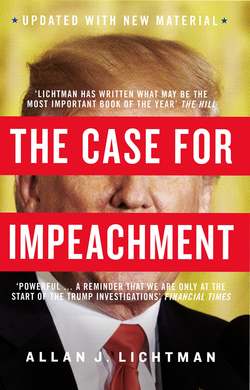Читать книгу The Case for Impeachment - - Страница 18
THE WORST FATE THAT COULD BEFALL HIM
ОглавлениеOn April 15, 1865, just over a month after his inauguration, Lincoln died after the first presidential assassination in American history, and Johnson became the most accidental of presidents. In the wake of Lincoln’s death, Johnson showed a humility of the moment never seen in Donald Trump, commenting, “I feel incompetent to perform duties so important and responsible as those which have been so unexpectedly thrown upon me.” But Johnson’s humility did not last. His more enduring character traits inclined him to stubbornness, hasty action, disdain for cautious advice, and ill-tempered retorts against critics.13
Johnson loved the Union but not the black people it had liberated from slavery. Although later in life a moderately wealthy slaveholder, Johnson rose from the lower ranks of white society, what some at the time called “mudsills,” the humble white farmers, laborers, tradesmen, and mechanics that, like Trump, he had championed in his political campaigns. He saw mudsills as threatened both by aristocrats from above and aspiring black people from below. At an outdoor rally, he told a crowd of cheering white men that he was their Moses who would lead “the emancipation of the white man” from their slavery under postwar Reconstruction. Johnson, declared the former slave and abolitionist Frederick Douglass euphemistically, is “no friend of our race.”14
Johnson was an odd man in his time. He was an apostate Democrat assuming the incumbency of a Republican president. He lacked allies in either party and prided himself as an outsider untethered to a capital city that he called “12 square miles bordered by reality.” By opposing efforts to reconstruct the nation and integrate newly freed slaves into American life, Johnson quickly fell afoul of a Congress controlled by Republicans with southern states still in limbo. He pardoned from the consequences of rebellion thousands of wealthy planters, some of whom with their wives had wined and dined him in Washington. With his humble roots and his penchant for spouting populism but privileging the rich, Johnson foreshadowed Trump.
Johnson pushed to restore southern states swiftly to the Union with no controls on race relations. He lambasted the “Radical Congress” for giving blacks privileges “torn from white men.” In a comment eerily similar to Trump’s denigration of a “so-called judge,” Johnson decried Congress as “a body called or which assumes to be the Congress of the United States.” He proclaimed to be protecting America, not from ex-Confederates, but from radical Republicans and their Negro allies. He forced Congress to override his vetoes on legislation aimed at protecting black rights and safety in the South and exploited his powers as president to evade and obstruct the enforcement of these laws.15
Johnson’s conduct had tragic consequences for black people in the South. He restored to power, political and economic, much of the old slaveholding elite, who proceeded to keep their former slaves poor, controlled, and powerless. He forced his successor president and Congress to essentially begin anew much of the process of Reconstruction. Ultimately Reconstruction failed. The South remained mired in poverty, and the white supremacists who regained full control of southern governments imposed on African Americans the Jim Crow system of segregation and discrimination that endured for nearly a century. The failure of Reconstruction, “to a large degree,” wrote the historian Michael Les Benedict, “could be blamed alone on President Johnson’s abuse of his discretionary powers.”16
In 1867, murmurings of impeachment began to circulate among exasperated, radical Republicans in Congress. In March, they had enacted over Johnson’s veto the Tenure of Office Act, a law that cut into his powers by prohibiting the president from replacing without consent of the Senate any federal official who had previously won Senate approval. To bait an impeachment trap, Congress inserted a clause that said any violation constituted a “high crime and misdemeanor.” And then, they waited.17
